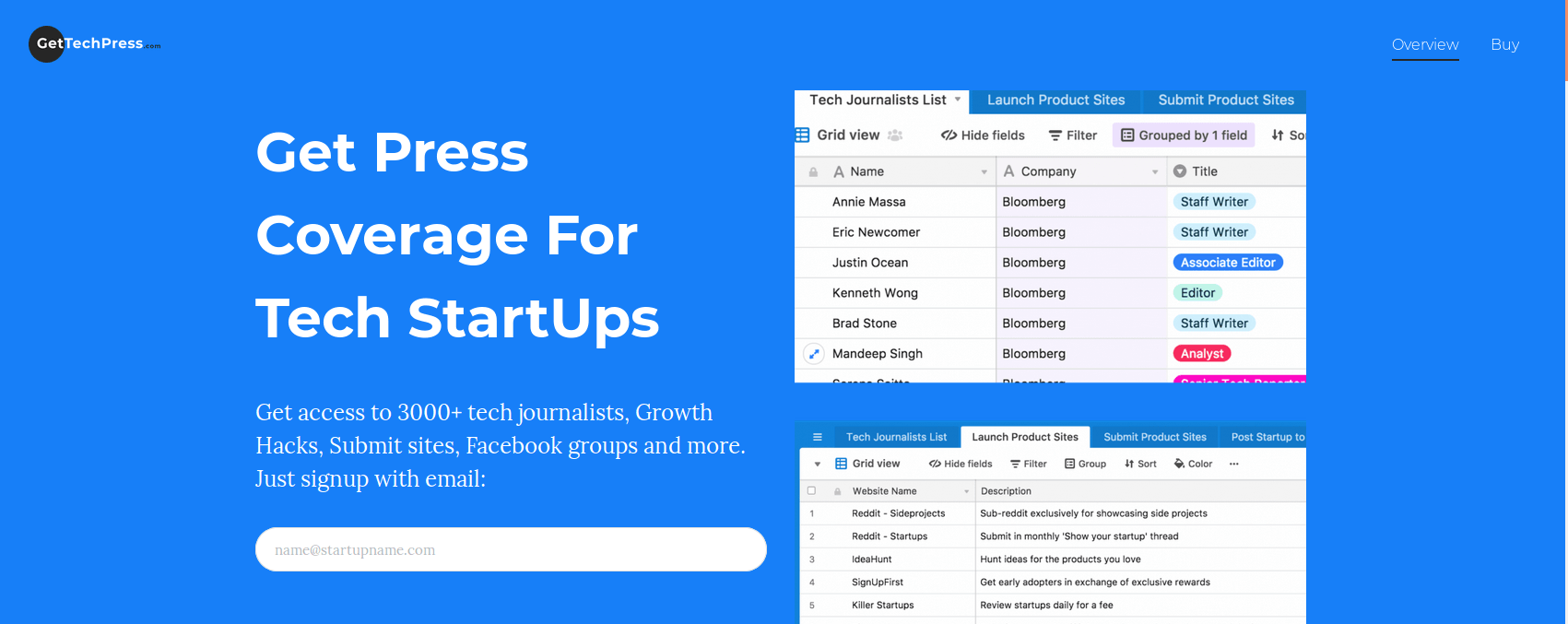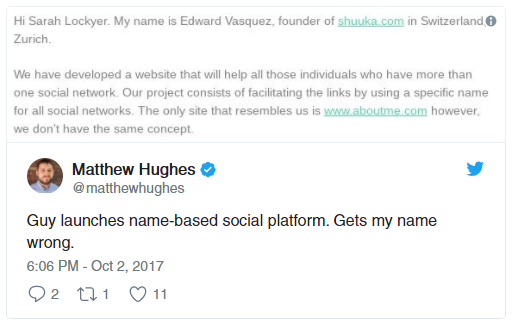

- From our Sponsors -
One of my resolutions for 2018 was I wouldn’t write about the fraught relationship between technology journalists and the startups and publicists that pitch to them. Partially because nobody cares. It’s such a niche subject that’s relevant to only a handful of people. The punters at home aren’t interested; they just want to read about cutting-edge tech.
But New Years resolutions exist only to be broken, and here I am writing yet another piece about article pitching. Sorry about that, but trust me, I’ve got a good reason to.
Yesterday, a friend pointed me in the direction of a product that was surging through the Product Hunt charts. Get Tech Press is a subscription service where, for a monthly fee of $29, you can access a list of over 3,000 technology journalists.

It also offers to direct entrepreneurs towards specialized Facebook groups and launch sites, where they can expose their work to a baying audience and build traction.
Get Tech Press isn’t an inherently unique concept. There are many other sites like it. The appropriately-named press.farm, for example, offers roughly the same product for as little as $18 per month. TechCrunch wrote a scathing article about this when it first came out. And that’s just one example. A search of Product Hunt yielded lots more in the same vein.
I get the appeal of these product. Genuinely, I do.
Startups are all about exponential growth, and this happens by getting the word out. If you’re a founder running your company on a shoestring budget, you almost definitely don’t have the funds to hire a traditional public relations firm.
It’s hard to understate how expensive this can be. PR firms typically charge a retainer, as well as a monthly fee. The retainer alone can be five figures.
Services like Get Tech Press offer a compelling DIY solution for founders. They’re spared ‘the effort of building a list of reporters to target. Raising awareness is as easy as copying a bunch of names into their email client’s BCC field, and then hitting ‘send.’
The legwork that ordinary PR people do — building relationships, reading mountains of coverage to identify appropriate reporters, crafting bespoke and personal pitches — is circumvented by this approach.
And it shows. By definition, bulk pitches are really impersonal. In the same way you’re more likely to open a letter from your grandmother rather than a piece of mass-mailed marketing, journalists are more inclined to open relevant, personalized pitches over ones that are clearly ‘spray and pray.’
It’s just a fact. Mass-mailed pitches are visible from a million miles away. They rarely mention the journalist’s name or publication (mail merge is hard, you guys), and include vague flattery like “I think your articles are good and interesting, and touch on subjects that are important.” I’m convinced.
Quite often, they’re about things I’d never cover, like crap Kickstarters for household goods. Absolutely nobody needs to crowdfund a bottle opener.
My personal favorite is when mail merge fails, and you get emails that start with “Hello [FIRST_NAME],” or with the wrong name entirely. Those pitches are usually worthless, but they’re good for a few chuckles on Twitter.

If you’re a startup trying to get media attention, the appeal of reaching literally thousands of reporters is undeniable. But in reality, if you send out a mass-mail, you’re just going to alienate the reporters that otherwise might be amenable to your idea, product, report, or company.
A PR masterclass, by someone who has literally never done PR in his life
I’m not a PR professional, but I’ve been subjected to some pretty horrendous pitches over my time. I’ve also seen some pretty good ones, too. That fact alone (and perhaps the existence of the Dunning-Kruger effect) leads me to believe I’m in a position to dole out some unsolicited advice on how startups can pitch themselves.
Firstly, you’re going to need some essential equipment: a web browser and an email address.
Let’s suppose your product is in the blockchain space. I’m going to assume that’s the case, simply because about 70 percent of all pitches I get these days are about the fucking Blockchain.
Pick some sites you’re going to target. This should be a list of the major tech blogs, plus smaller (but respected) sites in your startup’s niche.
Then pick some reporters. Most tech news sites assign reporters to specific beats, or areas of interest. At TNW, for example, my colleagues Mix and Tristan cover blockchain and crypto. My interests are primarily software development and security.
Find the reporter that covers your startup’s niche. Then send them an email. You typically can find their contact details on the site they write for, or under their Twitter bios.
Your email should be short (ideally, less than 200 words). It should use plain, simple language and avoid buzzwords. You should reference previous coverage, and discuss why your product is relevant to that reporter.
One of the best pitches I ever got was for a now-defunct video sharing website. The person pitching it wrote:
Quick pitch:
Vidd.me lets anyone upload videos instantly from iOS, Android, or the web. It gives you a short URL for that video, perfect for mass-sharing on sites like Reddit.
That’s it. It’s super simple, but years later I still remember it.
If there’s a press release to go with your pitch, copy it in the area below your email signature. If you’ve got visuals, make sure they’re individually attached to your email, and that the reporter doesn’t have to manually fish them out from a word document, or something. And it’s often helpful to include a phone number, so if the journalist has an urgent inquiry, they can get in touch with you.
That’s about it. It’s super simple. Bad pitches are often the product of people trying too hard, and forgetting that reporters are almost always buried under a mountain of email. It’s basically their default state. Short and simple is always best.
Okay, that’s it.
I hope you enjoyed the sole rant about tech PR that I’ll write in 2018. At least, I hope it’s the sole one, although if something pisses me off, all bets are off.
There are a lot of products out there that promise to help entrepreneurs reach the tech press. They’re often cloaked under the nebulous jargon of “growth hacking.” Speaking as the recipient of hundreds of pitches a day, they’re largely worthless.
If you want to get the word out, it’s easy: just have a good product, and take the time to tell your story. If you’ve gotten to the point where you’ve actually built something, you probably have a good one, and it should be heard. Don’t undersell yourself by cutting corners.
Author Info:
This article was first published by Matthew Hughes on TheNextWeb
Related:
- From our Sponsors -